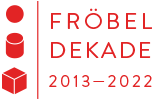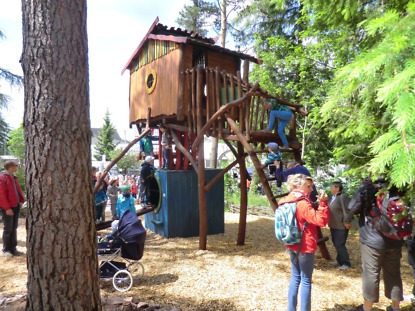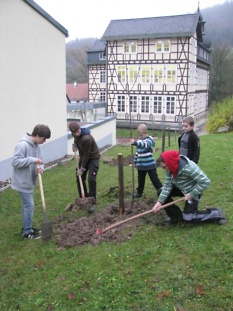Fröbel and Nature
Fröbel’s early childhood education model is implicitly connected with nature as an indicator for growth and development. This can be seen, amongst others, in the term “kindergarten” which was coined by Fröbel. The inclusion of nature in the raising of children was considered by Fröbel to be a basis for healthy development and as crucial for ethical behaviour. Through nature, he believed that a child could best discover the interconnectedness of life, as well as obtain a consciousness for God and an appreciation of the coexistence of life both in and within the child’s environment. Even the smallest child, according to Fröbel, could experience the laws of nature in a way appropriate to their age.
Projects and Activities during the 2014 Themed Year "Fröbel and Nature"
Tree Planting, Fröbel Forest and Playground, Trail Access Points
The 2014 themed year “Fröbel and Nature” began with a tree planting action entitled “100 Trees for Fröbel’s Garden”. The aim of the action was to plant 100 fruit trees of older varieties in meadow orchards along the Fröbel Trail between Bad Blankenburg and Keilhau. Children from the Fröbel Kindergarten in Bad Blankenburg helped to plant the first fruit trees in spring. In autumn and the winter season, a number of sponsors for the trees were found and the project was continued in Keilhau and Großgölitz. All 100 trees were planted before the end of the year. The Schwarzatal’s meadow orchards – today unfortunately increasingly threatened – were commonplace in the region a century ago and the sight of them led Friedrich Fröbel to coin the phrase “kindergarten”.
The Oberweißbach and Schwarzatal Mountain Railway also adopted the 2014 themed year “Fröbel and Nature” by developing an adventure playground in alignment with Fröbel’s values. With the help of Rudolstadt artist Jess Fuller and in co-ordination with the Fröbel Network, a concept for a 10-station “Fröbelwald” (“Fröbel Forest”) was created. In May 2014, the first three stations were opened and have proved popular with visitors ever since. The opening of the remaining stations is due to follow shortly.
The development of a playground to translate Fröbel’s intentions into an outdoor space was the wish of the Fröbel Network. This was realised with a co-operation agreement with the Bauhaus University in Weimar. Over the year, students of the university, as part of their studies, developed blueprints for outdoor play following the ideas of Fröbel. Implementation of the ideas and development of the prototypes will take place at a playground located at the Allianzhaus in Bad Blankenburg. Before this can occur however, certain legal processes must be followed to ensure project approval is granted.
The Schwarzatal is working towards fulfilling the criteria for certification as a “Quality Trail” hiking region, with the creation of trail access points. In the context of the year’s theme for 2014 “Fröbel and Nature”, Friedrich Fröbel has been chosen as the motif for these access points. The implementation of the idea is being conducted by an architecture bureau, in cooperation with the Bauhaus University in Weimar. In the years to come, the project will come under the auspices of the Regionalverbundes Thüringer Wald (Thuringia Forest Regional Network).
Fröbel Day in Bad Liebenstein, Education Conference in Erfurt
On June 19, 2014, members of the Fröbel Network – Friends of Friedrich Fröbel and the town of Bad Liebenstein – celebrated Fröbel Day in Bad Liebenstein under the patronage of Thuringia First Minster, Christine Lieberknecht.
The theme of “Fröbel and Nature” was a key part of Fröbel Day, and a well-rounded programme ensured there was plenty for both old and young to all enjoy. Highlights included a discussion under the theme “Theory and Practice of a Close-to-Nature Education Following Fröbel” and a conversation with Dr. Petra Steidl under the title “Comments on the Natural Pedagogy of Friedrich Fröbel”. In the afternoon, the focus shifted to a younger generaton, with the staging of a Children's Festival based on a similar event held in 1850 at the Altenstein Castle.
The 12th Thuringia Education Conference was a good opportunity for the Fröbel Network to present Friedrich Fröbel and his kindergarten concept to a wider audience. Through its information stand, the Fröbel Network was able to reach an interested, professional audience. The stand featured material about Fröbel and his philosophy, as well as information about the various Fröbel facilities in Thuringia and the Fröbel Decade projects.
Kindergarten considered for UNESCO Intangible Cultural Heritage listing
In November 2013, the Fröbel Network applied to the General Conference of UNESCO for recognition of Friedrich Fröbel’s kindergarten philosophy as an Intangible Cultural Heritage.
In April 2014, Fröbel’s Kindergarten was included as one of two short-listed suggestions from 13 applications from Thuringia. Unfortunately, in December 2014, the concept was not included in the final list for Germany.




